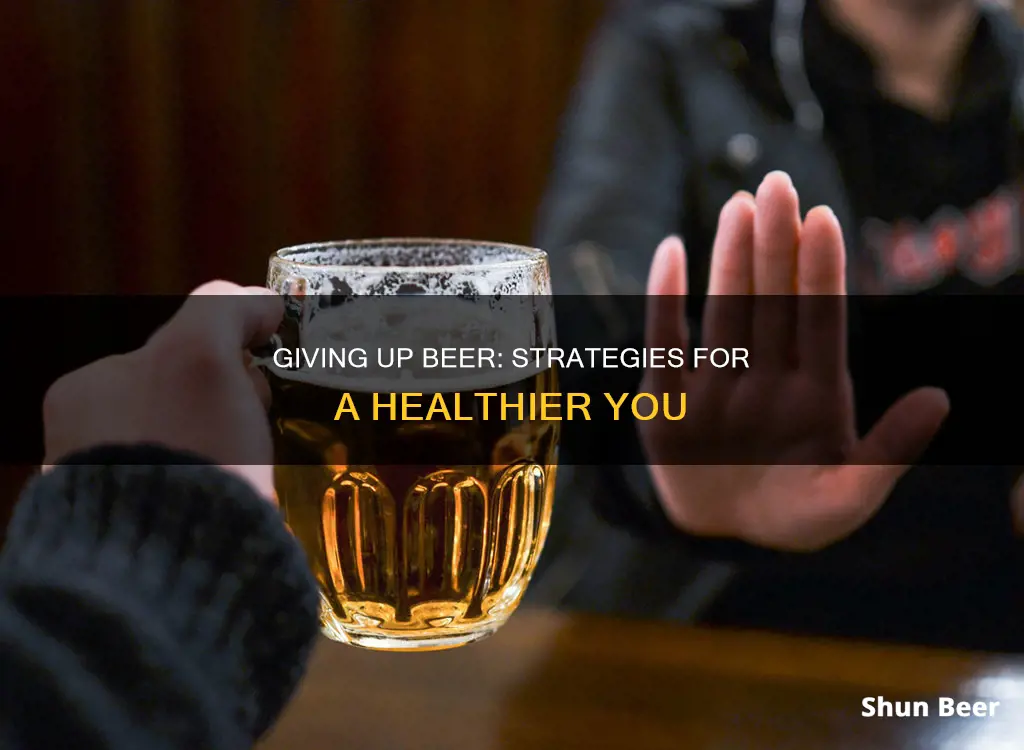
Giving up beer can be a challenge, but it's a positive step towards improving your health and overall well-being. The first step is to understand your relationship with alcohol and identify why you want to quit drinking beer. Be honest with yourself about your consumption and the impact it has on your life. Do you want to improve your health, save money, or enhance your personal relationships? Recognising these reasons can help motivate you.
Next, it's a good idea to consult your doctor, especially if you're a regular or heavy drinker. They can provide medical advice, create a withdrawal plan, and refer you to support services. It's important to have a plan and a support network to help you achieve your goal of giving up beer.
Some practical strategies include getting rid of any beer in your home, avoiding tempting situations, and finding alternative drinks that you enjoy. Let your loved ones know about your intentions so they can support you, and consider joining a support group or reaching out to a counsellor for additional help.
Remember, it's okay to take things one step at a time, and don't be too hard on yourself if you encounter setbacks along the way. Giving up beer is a journey, and you're taking a positive step towards a healthier and happier you.
| Characteristics | Values |
|---|---|
| Reasons to give up drinking | To feel healthier, sleep better, improve relationships, lose weight, save money, have more energy, reduce risk of long-term health problems |
| First steps | Understand your relationship with drinking, seek social support, practice self-care, develop new routines |
| Approach | Give up entirely or cut back, be mindful of drinking habits, make more informed choices about drinking |
| Support | Inform family and friends, seek professional support, join support groups |
| Environment | Remove alcohol from the house, find alternative drinks, keep busy with activities and hobbies |
| Self-care | Eat regular balanced meals, get regular physical activity, make sleep a priority, take up new hobbies |
| Persistence | Be persistent, setbacks are normal, focus on long-term goals |
What You'll Learn

Understand your relationship with drinking
Understanding your relationship with drinking is a key first step in giving up alcohol. This involves examining the health effects of alcohol, exploring your drinking triggers, and figuring out how much you actually drink.
Alcohol is a drug that can alter a person's emotions, perception, and thought processes. It is a known depressant that can lower your mood and inhibitions, which can sometimes lead to conflict with loved ones. Drinking excessively can also lead to accidents, injuries, and even death. It can affect your heart health, liver function, weight, sleep, immune system, and sexual health.
It is important to identify why you drink alcohol. Common triggers include stress, socialising, and enhancing experiences. Knowing your triggers can help you explore alternative ways to address these issues more productively. For example, instead of drinking to calm anxiety, you could try affirmations, deep breathing, or meditation.
Take some time to figure out how much you actually drink. You may not think you depend on alcohol, but you might be drinking more than the recommended limit. According to the 2020-2025 Dietary Guidelines for Americans, drinking alcohol should be limited to two drinks or fewer a day for males or one drink or fewer a day for females. A standard drink is defined as 12 ounces of beer, 5 ounces of wine, or 1.5 ounces of distilled spirits.
By understanding your drinking habits and triggers, you can make more mindful choices about drinking and develop a healthier relationship with alcohol.
Beer and Penicillin: Safe Mix?
You may want to see also

Identify your triggers
Identifying your triggers is a crucial step in giving up drinking beer. A trigger is a situation or place that makes you want to drink. For example, you may associate drinking with certain events, such as holidays or going to the pub with friends. It is important to be aware of these triggers and to make a plan for how to deal with them. Here are some tips to help you identify and manage your triggers:
- Keep a diary of your drinking habits for three to four weeks. Record what and how much you drank, as well as where you were and how you were feeling. This will help you identify any patterns or triggers and allow you to compare your drinking habits to your goals.
- Identify the times and places when you usually drink. For example, do you tend to drink after work on Fridays or in front of the TV in the evenings? Knowing this will help you fill the gap with alternative activities that do not involve drinking.
- Ask yourself some questions to help pinpoint your triggers: Where are the places I drink the most? What times do I drink the most? Do I want to drink, or do I feel pressured to drink? Knowing the answers to these questions will help you understand your drinking habits and work out ways to avoid situations where you might be tempted.
- Avoid your triggers if possible. If you usually drink at the pub, try staying away from there for a while. If you tend to drink at home, make sure there is no alcohol in the house.
- Have a plan for how you will deal with your triggers. For example, if you usually drink with friends, suggest meeting at a cafe instead of a bar, or organise alcohol-free events. If you can't avoid your triggers, try swapping the alcohol for something else, like meeting a friend or doing a hobby.
- Prepare some responses to help you turn down drinks. You could say something like, "I'm cutting back for my health" or "I don't like the way drinking makes me feel." Practising these responses will make you feel more comfortable and confident when saying no to a drink.
- Get support from friends and family. Let them know about your goal to stop drinking beer, and ask them to help you stick to your plan when you are in situations that involve alcohol.
Identifying and managing your triggers is an important part of giving up drinking beer. It may take some time and effort, but it will be worth it to help you achieve your goals.
The Science of Sipping: Beer Steins Explained
You may want to see also

Change your environment
Changing your environment can be a powerful tool when giving up drinking. Here are some strategies to help you modify your surroundings and reduce exposure to triggers:
Remove Alcohol from Your Home
Having alcohol easily accessible can be tempting when trying to quit. Removing alcohol from your home can help limit your drinking. If you feel like having a drink, knowing that you will have to go out and purchase alcohol may deter you long enough to find a distraction.
Find a Go-To Non-Alcoholic Drink
Choosing a replacement beverage can help you resist the urge to drink alcohol. Water, flavoured sodas, teas, mocktails, and other non-alcoholic drinks can all be good alternatives. Drinking something non-alcoholic can also help you feel included in social situations where others are consuming alcohol.
Keep Busy with Alternative Activities
Engaging in alternative activities is a great way to distract yourself from cravings and break the pattern of drinking. Staying active is often helpful, so consider activities that get you out of the house and moving. For example, you could try hiking, cycling, dancing, or roller-skating.
If you tend to drink at a specific time of day, doing something else during that time can be particularly effective in breaking the habit. For instance, you could take up a new hobby or revisit an old one, such as painting, board games, playing a musical instrument, or woodworking.
Identify and Avoid Triggers
Identifying your triggers, or the situations and places where you are tempted to drink, is crucial. For many people, the pub or bar is an obvious trigger, but it is also important to consider whether alcohol is readily available at home. Making a shopping list before going to the supermarket and not including alcohol on the list can help reduce the temptation to purchase it.
Additionally, try to identify the times when you would usually drink and fill that time with something else. For example, if you typically go to the pub after work on Fridays, you could organise to meet friends at the cinema instead. Or, if you tend to drink in front of the TV after work, try doing something active instead, such as a beginner's yoga tutorial on YouTube.
Socialise with Friends Who Don't Drink
If alcohol is a significant part of your social life, consider socialising more often with friends who don't drink. You could also suggest venues that offer mocktails or catch up over coffee instead of at a pub or bar.
Plan for Events with Alcohol
If you find yourself at an event where alcohol is being served, it can be helpful to have a plan in place. This might include saying no to drinks, drinking non-alcoholic alternatives, choosing low-strength alcohol, counting standard drinks, and setting a limit for yourself. Practising your refusal ahead of time can also make you feel more comfortable and confident when turning down a drink.
Beer and Gastritis: Is It Safe to Drink?
You may want to see also

Prepare for alcohol detox
Quitting alcohol can be challenging, and the process may be uncomfortable and even dangerous. It is important to prepare and be aware of the risks involved. Here are some steps to help you prepare for alcohol detox:
- Seek Professional Help: Alcohol detox is most effective and safest when done under the guidance of medical professionals at a detox rehab centre. They can provide medical care, monitor your health, and prescribe medications to ease withdrawal symptoms.
- Create a Supportive Environment: If you decide to detox at home, ensure you have limited contact with people and create a positive, supportive atmosphere.
- Remove Alcohol: Get rid of any alcohol in your home to avoid temptation and help control cravings.
- Clear Your Schedule: Take time off work and put aside responsibilities to focus solely on your recovery.
- Hydration: Drink plenty of water and fluids to combat dehydration caused by withdrawal symptoms such as vomiting, diarrhoea, and sweating.
- Nutrition: Eat nutritious foods to support your body during detox. Focus on whole grains, fruits and vegetables, lean proteins, and vitamin B-rich foods.
- Vitamins and Minerals: Take vitamins and minerals such as B vitamins, multivitamins, vitamin C, vitamin E, and calcium to help your body remove toxins.
- Be Aware of Withdrawal Symptoms: Withdrawal symptoms can range from mild to severe and may include headaches, anxiety, shaking, nausea, disorientation, seizures, hallucinations, and delirium tremens (DTs). These symptoms typically peak around 10-30 hours after the last drink and usually subside within 1-2 weeks, but this timeline can vary.
- Get Support: Find a friend or family member to help you through the process and provide medical assistance if needed.
- Address Co-Occurring Disorders: Many individuals with alcohol addiction also struggle with mental health disorders such as depression, anxiety, or personality disorders. Addressing these underlying issues is crucial for long-term recovery.
Remember, it is always best to consult with a medical professional before starting your detox journey to ensure a safe and effective process.
Beer and Gym: Drinking After a Workout, Good or Bad?
You may want to see also

Make time for self-care
Quitting drinking can be stressful, especially if you turn to alcohol to manage emotional distress. However, good self-care practices can help you manage overwhelming feelings and take care of your mind and body. Here are some tips to help you make time for self-care as you give up drinking beer:
Eat regular, balanced meals
Try to include foods that increase energy and boost your mood. A well-balanced diet can provide your body with the nutrients it needs to function optimally and improve your overall health.
Get regular physical activity
Physical activity can be a great way to take care of yourself both physically and mentally. It can help improve your mood, increase your energy levels, and provide a healthy distraction from cravings. Try hiking, cycling, dancing, or roller-skating for enjoyable ways to stay active.
Prioritize sleep
Make sure you're getting enough sleep each night, aiming for 7-9 hours as recommended for adults. Alcohol can disrupt your sleep cycle, so improving your sleep hygiene can help you feel more rested and energized.
Find satisfying hobbies
Many people use alcohol to cope with boredom, so finding satisfying hobbies can be a great way to distract yourself from cravings and relax. This could include painting, board games, playing a musical instrument, woodworking, or other activities that bring you joy and a sense of calm.
Practice meditation and deep breathing
Meditation and deep breathing are great tools for managing stress and anxiety, which can be triggers for drinking. These practices can help you quiet your mind and relieve stress, rather than just covering it up as alcohol does.
Connect with friends and family
Spending time with loved ones can release feel-good hormones like serotonin and oxytocin, which can boost your mood and curb the urge to drink. It can also provide a sense of support and accountability as you work towards giving up beer.
Be kind to yourself
Self-compassion is an important part of self-care. Instead of criticizing yourself for slipping up, remember that no one is perfect and that what matters most is your ability to maintain an open and curious outlook as you learn what works best for you. Treat yourself with kindness and patience throughout your journey.
Beer and Omeprazole: Is It Safe to Drink?
You may want to see also
Frequently asked questions
If you are concerned that drinking beer may be affecting your health, talk to your doctor about it. Your doctor may be able to give you a better idea of how the alcohol you consume is affecting your body. Consider whether the amount of beer you are drinking may be affecting your work or your relationships.
Make a list of the reasons you want to stop drinking and keep it somewhere visible, like on your fridge. Avoid tempting situations. If you find yourself too tempted to drink in certain places or situations, then avoid those situations if you can. If you are unable to avoid going somewhere where you know you’ll be tempted, make a plan to help yourself resist the urge to grab a beer.
Giving up drinking beer can improve your mood and sleep, increase your energy, improve your relationships, help you perform better at work, and lower your risk of long-term health problems such as cancer and heart disease.







